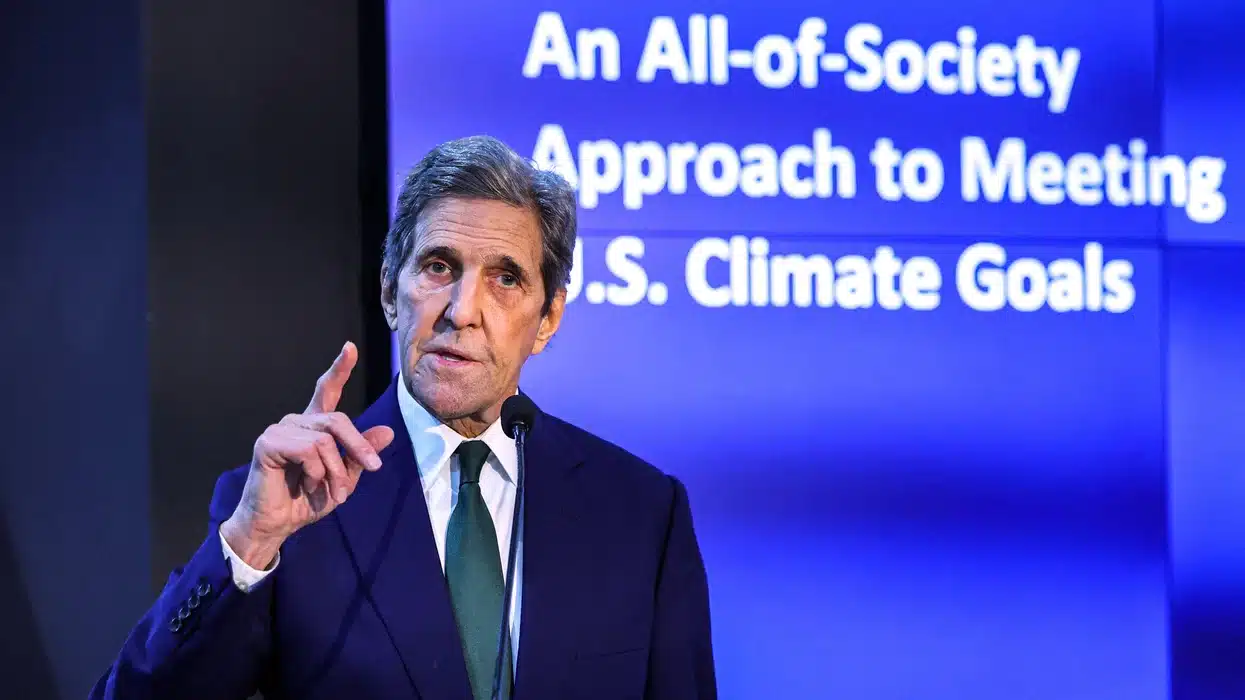Business
US Carbon Credits Scheme Get Cold Reception at COP27 Climate Summit

The Biden government has yet to do much to help poor nations deal with climate change, and now it hopes big business will pay. The Biden government has yet to convince Congress or the public to spend more on climate aid through carbon credits.
Now they’re trying to make it easier for private corporations to send money to the developing world in exchange for looking green at home.
John Kerry announced the plan at the Wednesday COP27 climate summit in Egypt. It involves tapping private funds to finance developing nations’ transition to clean energy by selling “high quality” carbon credits to companies trying to make their carbon emissions “net zero.”
Kerry said at a launch event, “We want to put the carbon market to work, deploy otherwise idle capital, and speed the transition from dirty to clean power.”
Environmental groups and climate experts opposed the idea, saying it would encourage polluters to continue. It came a day after the U.N. warned businesses about shady carbon credits.
An activist heckled Kerry as he announced the plan, accusing him of “promoting false solutions” before security guards removed him. Poorer nations criticized wealthier nations at this year’s COP summit for not funding their “green transition.”
The developed world needs hundreds of billions of dollars to ditch coal, oil, and gas, but Congress is reluctant to help.
Kerry said that without more money, climate change could not be stopped.
Kerry’s Energy Transition Accelerator proposal is backed by the Rockefeller Foundation and the Bezos Earth Fund. They hope it will unlock $100 billion for green projects by 2030. Kerry wants it operational by next year’s COP.
Under the plan, verified greenhouse gas emission reductions could be sold as carbon credits. Kerry said PepsiCo and Microsoft are interested in buying them.
Kerry said the credits would have “strong safeguards” Buyers, “not including fossil fuel companies,” need a net-zero CO2 emissions goal and a science-based interim target.
The credits can’t replace deep cuts to their emissions, and they only boost them.
Kerry said these carbon credits would only be allowed to phase out coal power plants in developing nations and create more renewable power. He called that “abuse-proofing.”
Companies, governments, and individuals who want to reduce their carbon footprint buy carbon credits. Environmental and climate activists say they’re problematic because they can’t guarantee reducing emissions.
Emissions from polluting human activities can be offset by farming practices that store carbon, planting trees, or capturing climate-changing gases from smokestacks and other equipment.
These activities are monetized and sold as offsets in net-zero plans.
A U.N. expert panel warned on Tuesday that tougher standards are needed to fight greenwash by companies and investors making net-zero pledges, including a ban on businesses and local governments buying cheap carbon credits instead of cutting their emissions.
Wednesday’s proposal drew skepticism.
Mohamed Adow, director of a climate and energy think tank, called carbon offsets an “accounting trick” that allows big polluters to continue polluting.
Big cuts in greenhouse gas emissions in both wealthy Northern nations and developing countries in the global South are needed, Adow said, “not rich polluting companies in the north paying to destroy the planet.”
“John Kerry knows the science on climate and what’s at stake for people, but his offsets threaten global efforts to cut emissions,” Adow said.
Climate scientist Bill Hare of Climate Analytics said the proposal shocked the climate summit and many governments.
“Because everyone must reduce emissions at this point in history.” John Kerry’s proposal means companies don’t have to reduce emissions if they buy offsets.
A senior European official questioned the U.S. launch proposal.
The official spoke anonymously due to the sensitivity of the topic.
Micah Carpenter-Lott, the heckler, wanted to call attention to big polluters, wealthy nations’ inaction, and Kerry’s “false solutions.”
“We don’t need to partner with polluters,” Carpenter-Lott said after being kicked out of the U.S. pavilion. “Polluters shouldn’t be here and shouldn’t be allowed to partner with governments because that won’t solve the climate crisis.”

Business
Walmart Provides Counseling Following the Sudden Death of a Teenage Store Employee.

(VOR News) – Details of the life of a 19-year-old Walmart employee in Nova Scotia, who perished in an industrial oven within the baking department, have been disclosed, despite the ongoing inquiry into the circumstances of her death.
To help the woman’s family financially, a GoFundMe page has been established. Gursimran Kaur is the page’s beneficiary. Her departure occurred on Saturday.
She reportedly worked with her mother, whose identity has been disguised, at the Walmart Supercenter in Halifax, Nova Scotia, for the previous two years.
A Walmart representative refused to say on Thursday if the deceased person’s mother was also employed by the store. Kaur was a member of the Maritime Sikh Society Gurudwara on Thursday, according to a statement published by the group’s representative.
According to a message shared by the GoFundMe website’s administrators, Kaur’s father and brother are now in India, and “we are trying to get them here as soon as possible.”
Walmart asserted that the family “provided and consented to” its data.
About $104,000 had been donated to the GoFundMe effort by Thursday afternoon, more than double the amount that was needed.
“We are supporting our associates during this extremely difficult time and have provided access to 24/7 virtual care and will provide on-site support, including grief counseling,” a Walmart representative said when asked if the company has donated to the former employee’s family and if it is offering special services to the Halifax team.
On Saturday night, Kaur and her mother were working the same shift at the Walmart Supercenter store on Mumford Road in Halifax, the capital of Nova Scotia, according to the GoFundMe site. Kaur was characterized as “a young beautiful girl who came to Canada with big dreams.”
Kaur’s mother allegedly “asked around” to try to find her daughter after she hadn’t seen her for an hour. The article mentions this information. “But everyone [supposedly] brushed [her] aside,” the post said, implying that Kaur may have been attending to a customer somewhere else in the Supercenter.
Her mother’s inability to speak to her daughter over the phone caused her to go into “panic”. This resulted from the fact that she seldom ever switched off her phone during the day. She reached out to the on-site administrator to ask for support. The 19-year-old employee’s body was discovered by Halifax Regional Police officers when they arrived at the scene at around 9:30 p.m.
“Imagine the horror that her mother experienced when she herself opened the oven, when someone pointed out to it,” the article’s author wrote, alluding to the discovery of Kaur’s “charred remains” inside the bakery’s walk-in oven “after a few hours.”
Walmart in Halifax has now closed for business.
According to a spokesman for the Department of Labor, Skills, and Immigration in Nova Scotia, a stop work order was also issued for the bakery and one piece of equipment that was situated within the establishment.
Halifax Regional Police, Nova Scotia’s medical examiner, and the Department of Labor’s Occupational Health and Safety Division are among the other organizations involved in the investigation. Although they have not stated how long the inquiry might take, all three authorities have admitted that it is expected to take some time.
“We are not providing any updates or any details at this point in time,” Halifax Regional Police Constable Martin Cromwell stated Thursday. “We are not sharing any information at this time.”
The medical examiner in Nova Scotia is “working closely” with the police to ascertain the reason for the sudden death and how it happened, according to an official representative for the medical examiner. According to the spokeswoman, “At this time, no additional details are available as the investigation is still in its early stages.”
Apparently, a Walmart salesperson made the statement on Wednesday. The spokesman went on to say, “As the police have stated, this is a very complex matter, and the investigation is ongoing.”
SOURCE: YFN
SEE ALSO:
IBM Struggles As Corporate Spending Slows Consultant Expansion.
Costco Is Offering The Peloton Bike+ At 300 Locations This Holiday Season.
Business
IBM Struggles As Corporate Spending Slows Consultant Expansion.

(VOR News) – The value of IBM shares decreased by over six percent on Thursday as a result of a decrease in the amount of money that the company spent on initiatives that were not associated with artificial intelligence (GenAI).
The business was able to achieve this by spending less money on those initiatives. Consequently, the consulting department of the firm faced considerable pressure from IBM, leading to a lack of clarity regarding the software division’s capabilities.
The phrase “GenAI,” an acronym for “GENAI,” signifies a comprehensive application of artificial intelligence. Should losses continue, it is probable that the company’s present market worth of $214 billion may diminish by more than $13 billion.
IBM’s possibility of losses makes this situation likely.
Customers of IBM have prioritized initiatives associated with artificial intelligence (AI) and have restricted their expenditures on discretionary IBM items due to the current economic climate of uncertainty.
This is due to the present uncertainty surrounding the economic climate. Due to this incident, the company’s consulting services have been hindered in their expansion, which has impacted the extension of these services. This has influenced the growth of these services.
The consulting industry continues to face a variety of challenges, as per the experts at RBC Capital Markets. According to the IBM financial experts, “consulting continued to experience headwinds regarding discretionary spend, as evidenced by the decrease in signings.”
The consultants reported that the infrastructure, which had been robust until this point, had slowed down in anticipation of the FY/25 refresh cycle. The comment that was made was the result of specialists’ observation.
According to the data provided by LSEG, total income was reported to have decreased to $14.97 billion, which was lower than the anticipated IBM figure of $15.07 billion.
The manner in which information was presented was indicative of this. According to estimates, this increase is expected to constitute approximately one percent of the total.
The research experts at Piper Sandler observed that the current decline in discretionary spending is a sign that there will be ongoing budget constraints in the near future for information technology, particularly in categories that do not involve artificial intelligence. “This is especially true for non-AI.”
However, there is a glimmer of hope for IBM’s growth and durability in 2025.
In contrast, IBM’s software segment demonstrated exceptional performance in the third quarter, with a 9.7% increase in revenue to $6.52 billion.
This was a remarkable rate of expansion. Without a doubt, this quarter was one of the most prosperous for the company. As a consequence, the division was elevated to the forefront of the company, rendering it the most prominent division.
Businesses are expanding the scope of their cloud infrastructure at a rapid pace to support the next iteration of artificial intelligence technologies. This is the reason for this. This has led to the occurrence of this phenomenon.
The business, on the other hand, anticipates that revenue patterns will persist in the upcoming quarter, with software from IBM continuing to be a strong asset.
However, consulting will encounter challenges as a result of discretionary expenditures and infrastructure upgrades in anticipation of the refresh that will occur the following year. This explains the issue, which is the result of the upgrade being scheduled for the year following the current year.
According to the statements made by IBM professionals who are employed by BofA Securities, it is projected that the consulting business will continue to be less robust in the first half of the year 2025.
In light of this, here is the forecast that has been produced. As a result of the cycle’s acceleration within the software and the mainframe, respectively, it is projected that this will be reduced. This is a positive development.
SOURCE: DN
SEE ALSO:
Costco Is Offering The Peloton Bike+ At 300 Locations This Holiday Season.
The Volkswagen China CMO Faced Expulsion From China Due To Drug Use.
Business
Costco Is Offering The Peloton Bike+ At 300 Locations This Holiday Season.

(VOR News) – Costco Wholesale Corporation COST is poised to attract fitness enthusiasts this Christmas season with the introduction of the Peloton Bike+ at its 300 sites nationwide and online.
The deal will occur during the holiday season. The wholesale retail giant and Peloton Interactive, Inc. (PTON) have collaborated to provide consumers with the opportunity to purchase high-quality fitness equipment at affordable prices.
Given Peloton’s established brand and the growing consumer demand for at-home fitness solutions, this initiative is expected to be advantageous for both companies.
For a brief while, we have been providing exclusive Bike+ rates at Costco.
The Peloton Bike+ will be available for purchase by Costco customers for a brief period starting on November 1, 2024, and ending on February 15, 2025, or until supplies run out.
With an extended guarantee that lasts for 48 months, the bike is expected to retail for $1,999 in-store and $2,199 online (including delivery). The same model, however, is listed on the Peloton website as costing $2,495.00.
Among the features of the Peloton Bike+ are a rotating screen and an auto-resistance mode that automatically changes strength in response to teacher cues. It is also possible to manually adjust the bike’s resistance knob.
Customers who purchase the $44/month All-Access Membership have unrestricted access to Peloton’s vast content library, which includes sixteen different training categories. It also allows users to set up separate accounts for every household member.
A Method for Interacting With Costco’s 136 Million Customers
The 136 million devoted Costco members will have the chance to save money on high-quality, well-known brand products thanks to this relationship, which is Peloton’s first seasonal retail engagement in the US.
By collaborating with Costco, which is renowned for its loyal customer base and dedication to offering premium linked fitness equipment at competitive costs, Peloton has significant potential to introduce its high-end connected fitness gadgets to a new and rich market.
The three main benefits of Costco are its customer-focused approach, strategic investments, and concentration on membership development. PTON will have the opportunity to engage with more members who are interested in physical fitness thanks to this collaboration.
The business has great expectations that it will eventually be able to expand its product distribution through Costco into new geographic areas and is particularly excited about the potential for learning from this first seasonal connection.
Other Details Concerning the Costco Stock Market
Costco’s success can be attributed mostly to its membership-based business strategy. This tactic produces a steady stream of revenue and cultivates outstanding client loyalty.
Access to Costco’s warehouses, where customers may buy a wide range of products at steep discounts, is granted to members upon payment of an annual fee. In addition to ensuring a steady flow of income, this plan’s execution gives the organization’s members a feeling of exclusivity and value.
COST is constantly changing due to shifts in the market and consumer preferences. The company’s product line is always growing to encompass a variety of goods and necessities that are highly sought after by customers. Costco has been able to increase its market share both domestically and abroad by using market research and creating customized products.
Costco’s promising future is a result of a number of variables, including as its appealing product mix, steady store traffic, pricing power, and sound financial standing. By employing a strategy that prioritizes lower pricing, Costco has been effective in drawing in customers who value convenience in addition to affordability.
Over the last six months, COST’s stock has increased by 23.5%, outpacing the growth of the overall industry by 12.4% and the S&P 500 index by 15.2%.
Costco is currently ranked as the second-best buy choice on Zacks. Here is the full list of stocks that have been assigned the Zacks #1 Rank (Strong Buy) for today.
SOURCE: YFN
SEE ALSO:
The Volkswagen China CMO Faced Expulsion From China Due To Drug Use.
American Airlines Paid $50 Million For How It Handled Disabled Passengers.
-
News3 weeks ago
The Biden Administration can go Ahead With Student Loan Forgiveness, Says a Federal Judge.
-
News3 weeks ago
Tesla Recalls 27,000 Cybertrucks Due To A Rearview Camera Issue
-
World3 weeks ago
Uber Hires Yandex Spinoff Ride-Hail and Autonomous Delivery With Avride
-
Tech3 weeks ago
Accenture and NVIDIA Collaborate to Enhance AI Implementation.
-
Tech3 weeks ago
Meta has started the Facebook Content Monetization Program.
-
Election News3 weeks ago
Chief Operating Officer Of Truth Social’s Parent Company Resigns
:max_bytes(150000):strip_icc()/carboncredit_definition_final_0928-e4012c9d34d54a4ca8f919cd4ba32698.png)







































